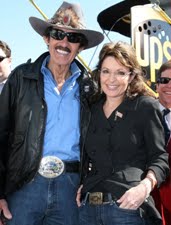
Two great opinion pieces. First up, a letter to the editor - The Nation Needs Sarah Palin:
-------
I read a lot of Letters in the Journal and sometimes disagree with them vehemently. However, I am in complete agreement with the writer of a Tuesday Letter to the Editor headlined "Sarah Palin: '24-karat character'" regarding his assessment of Sarah Palin. She is a common sense voice in a contaminated political pond. We need her. The nation needs her. We need her primarily because she seems to be the type who is reluctant to serve but will serve unselfishly if called upon to do so.
The more intellectuals bleat about her lack of intellectual prowess, the more I support her. She is the type of person we need today. We must all remember that sometimes - many times, without question - the best man for a job is a woman. Putting head and heart together is a rare commodity in this day and age. Sarah has that quality.
Perhaps the intellectual critics of Sarah should remember one important thing: People pay more attention to what we do than what we say. Few are better from the lectern than President Obama. He is a true mesmermizer. The problem is he does not always follow through with his rhetoric. He talks the talk but often fails to walk the walk. Sarah, I believe, will do both if elected.
One more important factor. Sarah believes in a higher power. She clings to it. This is the same power that made us great in the past. It can do the same thing in the future if we allow it to do so. Government without morality leads to personal and collective destruction.
Go for it, Sarah. The time is right. The time is now.
-- Ken Barker
----------

Next up, an article from the Patriot Post:
-----------
A country that can sneer at Sarah Palin but take Joe Biden seriously. That's how screwed-up we are.
God save us from our precious elite. They salivate on Pavlovian cue from NPR, the New York Times, the New Yorker, New York Review of Books or whatever is today's arbiter of intellectual fashion. No class is more easily guided than our conforming nonconformists.
The result is a mass elite (more mass than elite) about as exclusive as Facebook and as distinctive as a Starbucks latte. It's as if every lemming thought of himself as a freethinker.
Sarah Heath Palin's first qualification for president of the United States? She's not intellectually fashionable. How encouraging. Neither was Ronald Reagan. Some of us can remember when he was (a) a washed-up B-movie actor, (b) just a pretty face, (c) a mole for General Electric and a capitalist tool in general, (d) a right-winger warmonger who was going to blow up the world, and (d) all of the above.
Who knew he was going to end (a) the Cold War, (b) the nuclear arms race, and (c) the decline of the West? If this Sarah Palin is anything like the Gipper, some of us will be all for her.
Then again, there are troubling signs. It was as one thing when a brilliant, pagan, playful and general intellectual hottie like Camille Paglia showed up in Sarah Palin's corner; taking the unorthodox position is her orthodoxy.
But now Stanley Fish, that old post-mod deconstructionist and very model of a modern obscurantist, has given Miss Sarah's book, "Going Rogue," a rave review in the New York Times. This is too much. It's as if H.L. Mencken had come back to say a good word for William Jennings Bryan.
Hey, what a country. Its wonders never cease. Like Sarah Palin and who'll turn out to admire her next. That's just what worries me. How long before she'll be the subject of a sympathetic portrait in Vanity Fair, or on NPR?
I still love Sarah, but when the intellectual establishment begins to defend her, that's not a good sign. One of the reasons I always liked her was the people who despised her. If they start flocking around this little lady, I'm going to be awfully conflicted.
Somebody has done a word count on our president's Nobel Address, and it clocked in at some 4100 words, or roughly eight times as long as William Faulkner's imperishable 550 in 1950. ("I decline to accept the end of man. ... I believe that man will not merely endure: he will prevail.")
Will anyone be quoting Barack Obama's Nobel lecture half a century from now, the way we still quote Faulkner's? This president's words may be quoted when Faulkner's are forgotten -- but not till then.
The comparison is unfair. Barack Obama is only a politician, Faulkner was an artist. One cannot, should not expect as much from someone whose trade is only power, that most fleeting of phenomenal.
Let it be noted, too, that somewhere swaddled in all the time-bound, all-too-contemporary verbiage of this president's Nobel Address, along with the gratuitous attack on his predecessor that he seems to think is obligatory, at least when abroad, there was a new glimmer of understanding when it comes to the human condition:
"Evil does exist in the world," ergo "force is sometimes necessary" to combat it. And: "The United States of America has helped to underwrite global security for more than six decades with the blood of our citizens and the strength of our arms."
These are scarcely new insights, though they may be new to him. Our young president pronounced them with an air almost of discovery. But that he dared voice them at all in today's intellectual climate gives one hope.
Day by day, terrorist attack by terrorist attack, he learns. There is evil in the world and there is a need to combat it. But not just with words. Maybe one day he won't feel it necessary to use so many of them. ("An intellectual is a man who takes more words than necessary to tell more than he knows." --Dwight D. Eisenhower)
Old truths can be refreshing, especially when they come from a new source. But as welcome as these were from our ever-contemporary president, he can prove maddeningly slow. He now has told the country just how its counterterrorism system failed, unconnected dot after unconnected dot. But he didn't go to the root of the failure: his own preference for prosecuting terrorists, not waging war against them.
The latest enemy combatant captured in flagrante was being treated like any other defendant in criminal court, with all rights and privileges appertaining thereto, not promptly interrogated on a military base. The brig at Guantanamo, ideally located and designed for just such a purpose, is to be shut down. It seems our enemies object to it.
There is talk of getting this suspect -- and he is very suspect indeed -- to cooperate with our intelligence people as part of a plea bargain. It has come to this: plea-bargaining with the enemy.
Is this war or some theater of the absurd? It is neither; it is the strange world of Barack Obama, Eric Holder et al. How it must amuse those who would destroy us. They know that a civilization that won't defend itself won't be a civilization long.
Every time our lawyer president expatiates on the advantages of indicting our enemies -- rather than waging war against them -- the final scene from an old David Lean movie runs through my mind. You may remember it: "The Bridge on the River Kwai."
In the film, Alec Guinness plays the correct British colonel and prisoner of war who's completely lost touch with the larger reality, i.e., the war he's supposed to be fighting. Instead, he has concentrated his mind and efforts on the fine railway bridge he and his troops have built for their Japanese captors in the middle of the jungle. A good engineer, he's been true to his profession to the last. His is a madness inside the greater madness that is war itself.
In the end, all a stunned observer can say as he watches the colonel's proud handiwork come tumbling down is:
"Madness, madness...."



















No comments:
Post a Comment